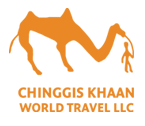Mongolia, people often think they know about it then think a bit a more and realise ‘perhaps I don’t know so much?’ So here’s 10 facts about Mongolia to make you an instant pub-quiz expert – a quick profile of the country and the things that make Mongolia the country that it is – so you can talk with some authority on the Land of Blue Skies…
1. PERSON – Chinggis Khan (1162-1227) is Mongolia’s most famous person. He founded the Mongol Empire and conquered most of Eurasia, unifying the nomadic tribes. He takes credit for developing the modern postal service, adopting the Uyghur script as his Empire’s writing system and controlling and promoting trade and communications along the Silk Road. Despite his ferocious reputation, he encouraged religious tolerance and practised meritocracy, and is still widely revered by modern Mongolians as their founding father and a national hero.
2. HISTORY – The Gobi Desert, where rock formations date back over 70 million years, has yielded the richest collection of dinosaur remains in the world. The area was made famous in the 1920s by American explorer and palaeontologist called Roy Chapman Andrews who discovered the first-known fossil dinosaur eggs. Most recently a Tarbosaurus Bataar skeleton was returned to Mongolia after the government successfully halted the private sale of the remains which had been looted from their country some years ago. It is now housed in Mongolia’s Central Museum of Dinosaurs in Ulaanbaatar with numerous other dinosaur fossils.
3. POLITICS – Mongolia fell under communist rule in 1921 and remained so for nearly 70 years. In 1990 after civil unrest, the country transitioned successfully into democracy, a multi-party system and a market economy.
4. RELIGION – The majority of Mongolians practice Tibetan Buddhism which was introduced to the country in the sixteenth century after links were forged with the Chinese Qing dynasty. Shamanism had been the national religion prior to that and still has an enduring effect on Mongolia’s culture and traditions. It is still practised today in remote areas. Islam is the religion of the Kazakh and Turkic people who live in the west of the country.
5. CULTURE – Mongolia is a land of nomads. People here have always lived in sympathy with the landscape, moving with their livestock as the seasons change. The traditional felt tent, a ger, is as integral to the sense of national identity as the concept of horsemanship is.
6. FESTIVALS – One of Mongolia’s most important festivals is the annual Naadam, meaning ‘games’, and is celebrated in July. The largest festivities take place in the capital. Ulaanbaatar, at the National Sports Stadium, but smaller games are held in every community across the country, with fierce competitions of the three ‘manly’ sports – horse-racing, archery and wrestling.
7. NATURE – Mongolia boasts a wide range of birds, fish and mammals but is probably best known for the Siberian Ibex, Snow Leopard, Gobi Bear, Wild Bactrian Camel and Przewalski’s Horse.
8. LANDSCAPE – The Land of the Blue Skies has a widely varied topography and the most dramatic landscapes. Wide, open grasslands or steppe in central Mongolia give way to the Gobi Desert in the South, the Altai mountains in the West and Taiga forest to the North.
9. ICONIC STRUCTURES – As befits the country’s national hero, the larger-than-life Chinggis Khan, a monument has been built to his memory about 33 miles east of Ulaanbaatar. The Chinggis Khan Equestrian Statue is 40m high and depicts the emperor on horseback. It is part of a busy tourist centre and visitors can walk through the statue to the head of the horse to enjoy an incredible panoramic view.
10. ETHNIC GROUPS – After the Khalka who are the largest ethnic group of Mongol people at 86%, the second largest ethnic group are the Kazakhs who live in the west of Mongolia. They are differentiated from the rest of the population by language (the Kazakh language is part of the Turkic language family) and by religion – Sunni Islam. A small minority of Kazakh people are also eagle hunters, who hunt foxes and hares with their own trained Golden Eagles from horseback. In September and October, this tradition is honoured with the two Eagle Festivals in or near to Bayan Ulgii.
If you want to go to Mongolia then take a look at some of of suggested itineraries for private tours and vacations.


